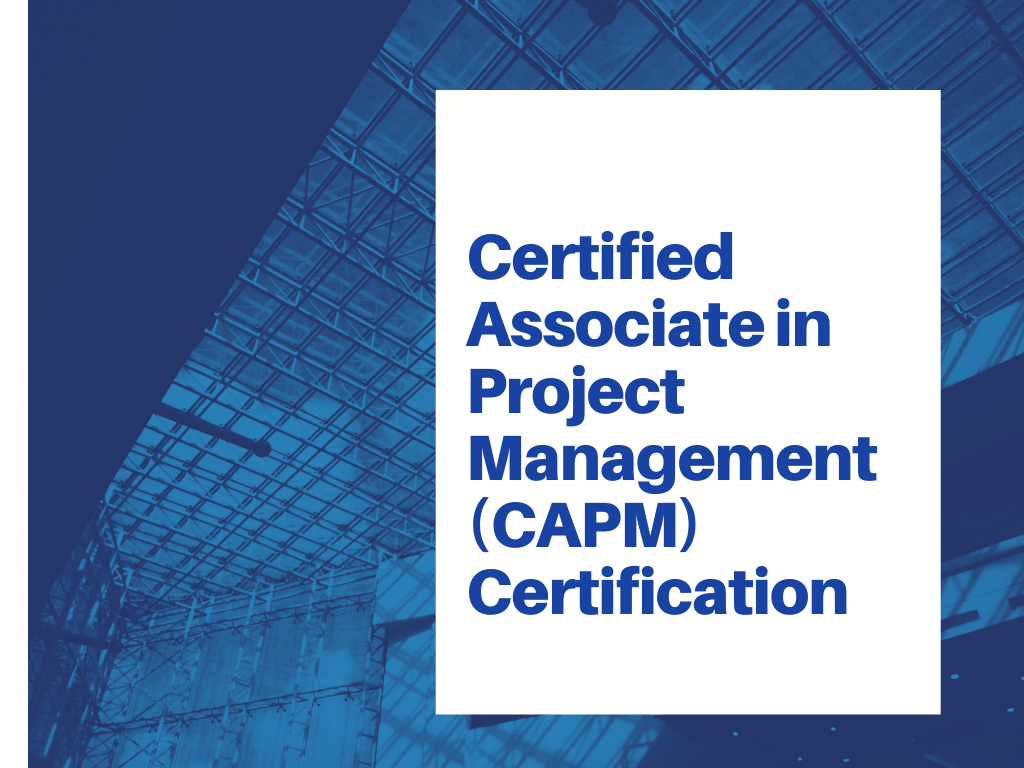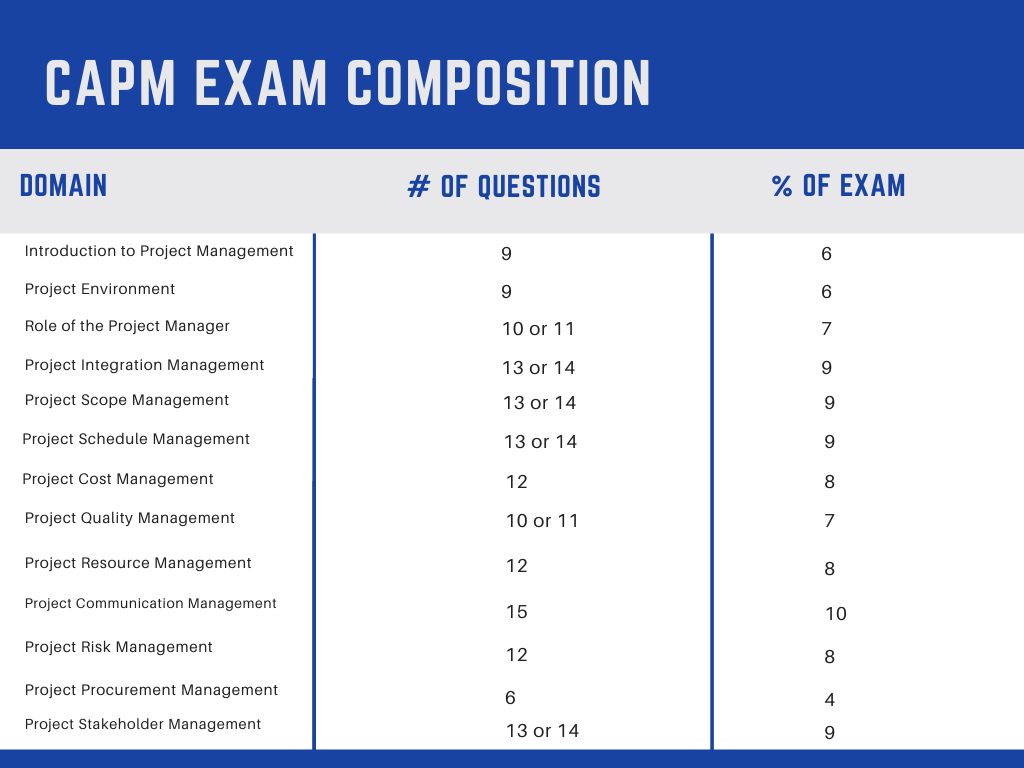What is the Certified Associate in Project Management (CAPM) Certification

Exam syllabus
The CAPM exam is administered by the Project Management Institute (PMI). The exam is based on the CAPM Examination Specification as detailed in the CAPM Examination Content Outline, which describes tasks/activities from 13 domains:
- Introduction to Project Management (6%)
- Project Environment (6%)
- Role of the Project Manager (7%)
- Project Integration Management (9%)
- Project Scope Management (9%)
- Project Schedule Management (9%)
- Project Cost Management (8%)
- Project Quality Management (7%)
- Project Resource Management (8%)
- Project Communication Management (10%)
- Project Risk Management (8%)
- Project Procurement Management (4%)
- Project Stakeholder Management (9%)

The exam consists of 150 multiple choice questions based on the CAPm Exam content Outline PMBOK guide and the PMI Code of Ethics.
The exam is a closed-book one with no reference materials allowed. The only reference materials allowed are your brain-dumps (allowed on the materials you are given for rough sketches when the proctor checks you into the exam center). The Online Proctored Test (OPT) allows virtual whiteboard while Center-based Testing (CBT) allows physical sheets and pencils for note taking.
Item references
An exam question with its possible answer choices has at least two references to standard books or other sources of project management. Most of the questions reference the PMI A Guide to the Project Management Body of Knowledge (otherwise known as the PMBOK Guide) which is currently in its sixth edition (2018). The PMP exam changed in March 2018 to align with the updated guide.
The Project Management Framework embodies a project life cycle and five major project management Process Groups including:
- Initiating
- Planning
- Executing
- Monitoring and Controlling
- Closing
There are ten project management Knowledge Areas mapped to the process groups and they include:
- Project Integration Management
- Project Scope Management
- Project Schedule Management
- Project Cost Management
- Project Quality Management
- Project Resource Management
- Project Communications Management
- Project Risk Management
- Project Procurement Management
- Project Stakeholder Management
The process groups and Knowledge Areas are parents to a total of 49 processes.
These processes are described by i) what they are, ii) why they are performed, and iii) when they are performed. They are also described by their inputs, tools and techniques, and outputs.
The PMBOK emphasizes the importance of tailoring based on project needs, environments, and other prevailing constraints. It additionally emphasizes how different process groups interact and rely on each other.
Examples include:
- Defining the dependency between the process groups on a project based on the project constraints.
- The output of a particular process as an input to another process. E.g. Validated Deliverable as an output of Control Quality process and an input of Validate Scope process
Purpose
Non-Profits, government, and other organizations rely on CAPM certified professionals to be part of their teams to improve the success rate of projects. This is because they are able to apply their specialized knowledge of the standardized and evolving set of project management principles contained in the PMBoK Guide.
The project management certification is among the topmost in-demand certifications according to Business News Daily. Salary of project professionals with certifications have increased in value according to Forbes. With new project manager jobs being added to the market on a daily basis, holding this credential provides an edge above the competition.
Examination process
Pearson VUE testing centers provide the CAPM exam as a computer-based test either at a test center or remotely. They are administered with the supervision of proctors.
The exam consists of 150 questions. 15 are seeded questions, which are not included in exam grading. The overall score is based on the other 135 questions. Each multiple-choice question has one correct answer and three incorrect answers. There is no penalty for an incorrect answer.
As noted earlier, the examination can now be taken from home or an office location as extra options to sitting for the exams at the testing center.
There will be a live proctor and the requirements include a quiet environment, a reliable internet connection and a computer with a webcam.
Candidates who take the computer-based test receive their results (passed or not passed) on the screen immediately upon completion using PMI’s 4 proficiency levels (Above Target, Target, Below Target, and Needs Improvement) in each domain.
The proctors provide the exam results to the candidate on a score report after the examination.
PMI Audit
Random Audits are PMI’s modus operandi to verify the experience and/or education claims by certification candidates. This is done to maintain the integrity and standing of PMI as a body and the PMP certification and all other associated certifications.
Item writing
Item writing is used to add new questions to the CAPM Examination database while other questions are taken off using project management guides and texts as guides. Instructors, course developers, book authors, and other individuals who are active in the field of PMP exam education are not allowed to conduct item writing.
Eligibility Requirements
Candidates must meet the prerequisites in one of the following groups to be eligible for CAPM Certification:
- Secondary degree (high school diploma, associate degree or the global equivalent)
- 23 contact hours of project management education This is provided by PMI here.
Continuous Credential Requirements (CCRs) require Professional Development Units (PDUs)
Certified Associate in Project Management (CAPM) holders require a total of 15 Professional Development Units (PDUs) every 3-year Cycle to maintain their PMP certifications.
The following activities qualify as PDUs
- Creating educational content on project management topics using articles, videos
- Speaking at project management events
- Practicing as a project manager
- Attending project management training or courses
- Research in the field of project management
The PDUs must satisfy the components of the PMI Talent Triangle (technical, leadership, and strategic and business management expertise).
Other PMI credentials
PMP (Project Management Professional) is one of nine credentials offered by PMI:
- PMI Project Management Ready
- Certified Associate in Project Management (CAPM)
- Project Management Professional (PMP)
- Program Management Professional (PgMP)
- PMI Agile Certified Practitioner (PMI-ACP)
- Disciplined Agile
- PMI Risk Management Professional (PMI-RMP)
- PMI Scheduling Professional (PMI-SP)
- Portfolio Management Professional (PfMP)
- PMI Professional in Business Analysis (PMI-PBA)
